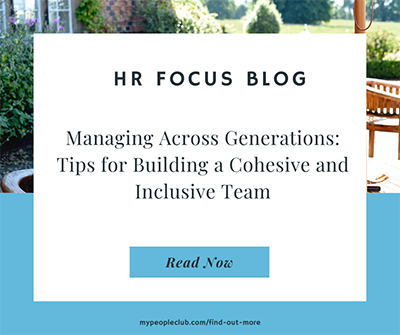I think it’s amazing that we now live in a world where the workforce is more diverse than ever, with multiple generations working together in the same office. As we start to live and work longer it can lead to a rich exchange of ideas and experiences and benefit individual, team and business growth. On the flip side it can also create challenges when it comes to managing up and down the generations, but when managed well, the benefits can be endless.
In this blog post, I’ll explore some tips and best practices for managing an intergenerational team.
Firstly, it’s important to recognise that each generation brings unique strengths and perspectives to the workplace. Rather than focusing on differences, as people managers we should celebrate the diversity of teams and find ways to harness the strengths of each generation. For example, Baby Boomers may bring a wealth of experience and institutional knowledge, while Gen Z may bring fresh ideas and a willingness to embrace new technology.
One key skills managers need to adopt early to managing an intergenerational team is to communicate effectively, yes I’m back again with the drum! It’s so important to understand that different generations may have different communication styles, so to be aware of these differences and adjust your approach, accordingly, will be a winner. Without generalising as we all have different communication styles, as an example you may have a Baby Boomer who may prefer face-to-face communication or phone calls, while your Millennials and Gen Z team members have a preference for email or instant messaging. This is why getting to know your team well, understanding how they communicate will be key.
Another important aspect of managing an intergenerational team is to provide opportunities for mentorship and learning. I’m such a huge fan of mentorship and wouldn’t be here today without the great mentors I’ve had along the way, in fact it’s something I’m looking to initiate in MyPeopleClub for our members this year. It can help to bridge the gap between generations and encourage knowledge sharing. For example, pairing younger employees with older mentors can provide valuable insights and help younger employees develop new skills, and vice versa.
Creating a flexible and inclusive work environment and fostering a culture that allows for open conversations can be a game changer. Different generations may have different needs and preferences when it comes to work arrangements, learning styles, ambitions, and progression plans. By accommodating these needs, managers can create a more inclusive workplace that values the needs of all employees.
One of the biggest attributes I think a manager can bring to a team is to lead by example. Be the behaviour you want to see in your team, including respect, open-mindedness, and a willingness to learn from others. By setting a positive tone, you can create a culture of collaboration and mutual respect that benefits everyone.
People management can be really tricky at time, and that’s why it’s important to continue to invest in your development. There are always new tools and techniques to pick up, new ideas and that’s why we have a dedicated section at MyPeopleClub on managing teams and leadership development. In there you’ll find guides on things like managing high performing teams, getting know people, development plans, learning logs and so much more. We’re already helping people managers across the UK become the best version they can be, come and see how we can help you HERE.

